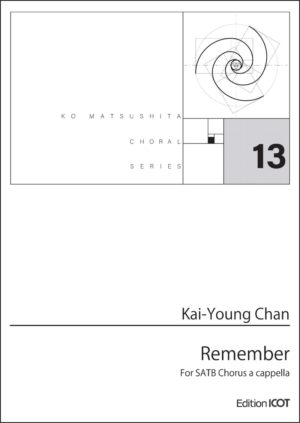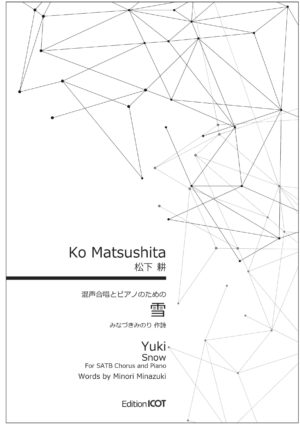Description
Composer:Salvo Gangi
Lyricist:Dante Alighieri
Parts:SATB
Accompaniment:a cappella
Language:Italian
Performance Duration:5’45”
Pages:12
Canto XIV of the Paradise of the Divine Comedy shows us the complexity of expressing and remembering the vision of God. This fragment “Così da lumi”, even if short, offers many ideas and an interesting definition of “music”. Music is “rapture” says Dante!
At the vision of God and the cross he remains entranced, lingering, almost without being able to describe what he is seeing and hearing.
The piece opens with a monochord and then gradually expands, like a ray of light. These beams of light first advance then retreat and sometimes gently collide with each other as if to musically describe a perpetual flow.
In this dreamlike vision, Dante sees a melody coming from the cross which inebriates him (21 bar). As if inside a celestial liturgy he sees a song that enraptures him. (23 bar.) At the moment of composing this section, the image of the experience of St. Augustine immediately appeared to me. The incipit of the tenor is a small quotation from the ancient hymn of St. Ambrose “Deus Creator Omnium” (1)which St. Augustine heard several times and which probably led to his conversion (2). I really enjoyed making these two combinations. This incipit will be taken up by all the sections which will first interact in a responsorial way and then counterpoint each other. After the reprise by the men’s sections (37 bar) the harmonic development and progressions are increasingly daring up to the climax (49 bar). Subsequently a descending vortex will follow created with nine sounds to symbolize the nine angelic hosts, each of which represents a movement of a sky with which Dante arrives with Beatrice in the empyrean which is infinite and immobile. In the empyrean there are God and the blessed.
The passage ends with Dante’s almost obsessive repetition describing the emotion for what he does not fully understand, for the transcendental realities he has seen and which have left a sense of excitement in him. The attempt to translate into words the metaphysical and transcendent experience of Heaven and God appears impossible. A fixed thought remains in him.
(1) Cf. SAINT AUGUSTINE, Enarratio in Psalmum 148; GIULIO CATTIN, Il Medioevo p.23ss.; UGO SESINI, Poesia e Musica nella latinità, p.66.
(2) “How many tears shed listening to the accents of your hymns and canticles, which sounded sweetly in your church! A violent emotion: those accents flowed into my ears and distilled the truth in my heart, arousing a warm feeling of pity in it. The tears that flowed did me good”. SAINT AUGUSTINE, Confessiones, 9, 6, 14:
CCL 27, 141 (PL 32, 769-770).
Printed score and digital score are prepared. Please choose one below.
Composer:Salvo Gangi
Lyricist:Dante Alighieri
Parts:SATB
Accompaniment:a cappella
Language:Italian
Performance Duration:5’45”
Pages:12

